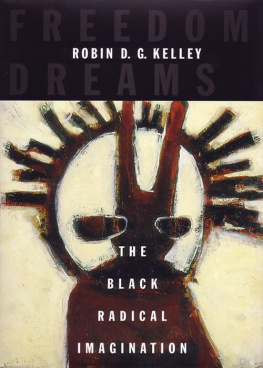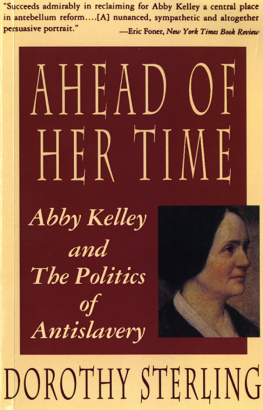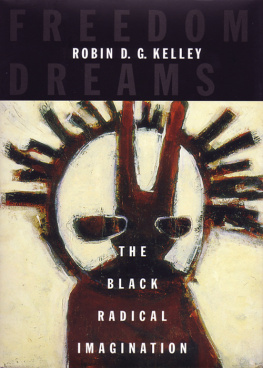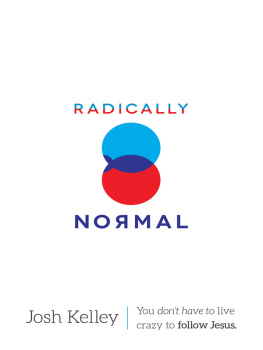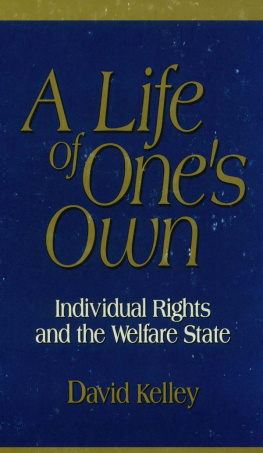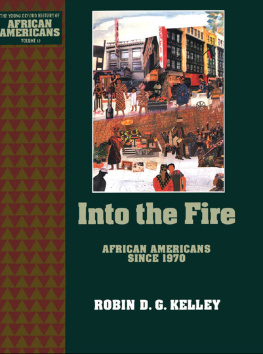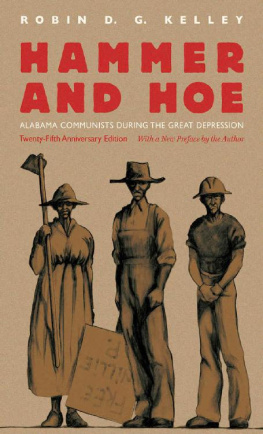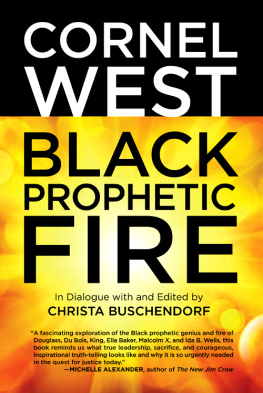Other works by Robin D. G. Kelley
Three Strikes: The Fighting Spirit of Labors Last Century (with Howard Zinn and Dana Frank)
Yo Mamas Disfunktional! Fighting the Culture Wars in Urban America
Into the Fire: African Americans since 1970
Race Rebels: Culture, Politics, and the Black Working Class
Hammer and Hoe: Alabama Communists during the Great Depression
To Make Our World Anew: A History of African Americans (coedited with Earl Lewis)

For my big sister,
MAKANI THEMBA NIXON
And in loving memory of
LISA Y. SULLIVAN
(19612001)
and
JOE WOOD, JR.
(19641999)
Three dreamers who do.
CONTENTS
PREFACE
Freedom Dreams is a kind of crossroads for me. I spent more than half my life writing about people who tried to change the world, largely because I, too, wanted to change the world. The history of social movements attracted me because of what it might teach us about our present condition and how we might shape the future. When I first embarked on this work nearly twenty years ago, the political landscape looked much clearer: We needed a revolutionary socialist movement committed to antiracism and antisexism. Buoyed by youthful navet, I thought it was very obvious then. Over time, the subjects of my books as well as my own political experience taught me that things are not what they seem and that the desires, hopes, and intentions of the people who fought for change cannot be easily categorized, contained, or explained. Unfortunately, too often our standards for evaluating social movements pivot around whether or not they succeeded in realizing their visions rather than on the merits or power of the visions themselves. By such a measure, virtually every radical movement failed because the basic power relations they sought to change remain pretty much intact. And yet it is precisely these alternative visions and dreams that inspire new generations to continue to struggle for change.
I had been thinking about these issues when Professor Judith Byfield and Ozzie Harris, director of Dartmouths Office of Equal Opportunity and Affirmative Action, asked me to deliver the Dr. Martin Luther King Jr. lecture at Dartmouth College in January 2000. In many ways, the opportunity to meditate on Kings legacy and vision brought a lot of these issues to the surface, especially since I was feeling somewhat alienated from the same old protest politics. What had happened to the dream of liberation that brought many of us to radical movements in the first place? What had happened to socialism the way we imagined it? What had happened to our New Eden, our dreams of building a new society? And what had happened to hope and love in our politics? My lecture consisted of a series of reflections on these questions, which consequently became Freedom Dreams.
Dr. King constantly warned us that we would not be able to build a truly liberatory movement without the strength to love. In his 1963 book of the same title, he wrote:
We Negroes have long dreamed of freedom, but still we are confined in an oppressive prison of segregation and discrimination. Must we respond with bitterness and cynicism? Certainly not, for this will destroy and poison our personalities. To guard ourselves from bitterness, we need the vision to see in this generations ordeals the opportunity to transfigure both ourselves and American society. Our present suffering and our nonviolent struggle to be free may well offer to Western civilization the kind of spiritual dynamic so desperately needed for survival.
Kings words became a kind of template for my lecture, indeed, for all of my thinking from that point on. How do we produce a vision that enables us to see beyond our immediate ordeals? How do we transcend bitterness and cynicism and embrace love, hope, and an all-encompassing dream of freedom, especially in these rough times?
Rough times, indeed. I was putting the final touches on Freedom Dreams the day the World Trade Center went downa horrible event I witnessed from my bedroom window. And as I sent off this manuscript to my editor, bombs were raining down on the people of Afghanistan and unknown numbers of innocent people were dying, from either weapons of mass destruction or starvation. Violence will only generate more violence; the carnage has just begun. Now more than ever, we need the strength to love and to dream. Instead of knee-jerk flag-waving and submission to any act of repression in the name of national interests, the nation ought to consider Kings vision and take a cue from the movement that proved to be the source of his most fertile ideas. The civil rights movement demanded freedom for all and believed that it had to win through love and moral suasion. Those committed to the philosophy of nonviolence saw their suffering as redemptive. The very heart of the movement, the extraordinary Southern black folks who stood nobly in the face of police dogs and water canon and white mobs and worked as hard as they could to love their enemy were poised to become the soul of a soulless nation, according to Dr. King. Imagine if that soul were to win out, if the movements vision of freedom were completely to envelope the nations political culture. If this were the case, then the pervasive consumerism and materialism and the stark inequalities that have come to characterize modern life under global capitalism could not possibly represent freedom. And yet, freedom today is practically a synonym for free enterprise.
Perhaps Ill be labeled a traitor for saying this, but we are not yet completely free. U.S. democracy has not always embraced everyone and we have a long history to prove it, from slavery and Indian wars to the 2000 presidential elections. Indeed, the marginal and excluded have done the most to make democracy work in America. And some of the radical movements I write about in the pages that follow have done awful things in the name of liberation, often under the premise that the ends justify the means. Communists, black nationalists, Third World liberation movementsall left us stimulating and even visionary sketches of what the future could be, but they have also been complicit in acts of violence and oppression, through either their actions or their silence. No ones hands are completely clean.
And yet to write another book that either drones on about how oppressed we are or merely chronicles the crimes of radical movements doesnt seem very useful. I conceived Freedom Dreams as a preliminary effort to recover ideasvisions fashioned mainly by those marginalized black activists who proposed a different way out of our constrictions. Im not suggesting we wholly embrace their ideas or strategies as the foundation for new movements; on the contrary, my main point is that we must tap the well of our own collective imaginations, that we do what earlier generations have done: dream.
Trying to envision somewhere in advance of nowhere, as poet Jayne Cortez puts it, is an extremely difficult task, yet it is a matter of great urgency. Without new visions we dont know what to build, only what to knock down. We not only end up confused, rudderless, and cynical, but we forget that making a revolution is not a series of clever maneuvers and tactics but a process that can and must transform us.
WHEN HISTORY SLEEPS: A BEGINNING
When history sleeps, it speaks in dreams: on the brow of the sleeping people, the poem is a constellation of blood.
Octavio Paz, Toward the Poem
Next page
